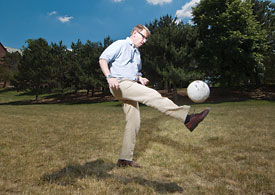The world will watch the high jumpers, long jumpers, runners, swimmers and divers as the London 2012 Olympic Summer Games open Friday.
But Stefan Szymanski — a native of host country Great Britain — won’t particularly be watching athletes. Instead, he’ll watch tourists.

Photo by Eric Bronson, Michigan Photography.
“I will be mainly interested in how crowded London is,” says Szymanski, the Stephen J. Galetti Professor of Sport Management in the School of Kinesiology. “While it is claimed that the games will boost tourism, it may well turn out that visitor numbers decline this summer.”
To test the notion that these events are a clear economic windfall for the cities that host them is not being cynical — it’s just what economists do, Szymanski says. Indeed, his studies of tourism during the 2011 FIFA World Cup in South Africa showed attendance was less than projected.
“Building sports facilities and hosting major sports events does little or nothing to boost the economy, but they do seem to make people happy,” he says.
What moment in the classroom or lab stands out as the most memorable?
Teaching American students how to play cricket.
What can’t you live without?
Mint brownies.
What is your favorite spot near campus?
Espresso Royale.
What inspires you?
The emergence of a pattern from seeming chaos.
What are you currently reading?
“Life in the Twenty First Century” (published in 1960 by Soviet academicians predicting the future).
Who had the greatest influence on your career path?
Probably George Yarrow, an economics tutor at Oxford, who persuaded my college that I should be allowed to switch subjects from classics to politics, philosophy and economics (normally you aren’t allowed to change degree subject).
Szymanski taught in London business schools before coming to Michigan nearly a year ago. “I’m an industrial economist by background, and the business of sport was just one topic I was interested in. But over the years I found the audience for my sports research was much larger than for anything else I did, so I focused on it more and more,” he says.
Simultaneously, the School of Kinesiology has been building a powerful sports management faculty. Szymanski, a researcher on sports economics and co-author of the recent book “Soccernomics” was drawn to the field. He cites its multi-disciplinary studies of a range of factors that impact economics, including sociology, history and public policy.
“For me, economics is the study of human well-being. People make choices to increase their well-being. A lot of people think economics is about money. It’s really about how people make choices and how they interact,” he says.
Sports also is a fascinating field of study for an economist, because sports markets provide quality data. “Even if I had data on, say, auto output, it would be very hard to decide on any objective basis who was the best car manufacturer. But when a sports team wins a championship, there is a clear measure of success,” Szymanski says.
Among the most striking things he’s learned through his research is how differently sports is organized in both the United States and in Europe. “When it comes to sports, Europe is the home of unfettered free markets, while the U.S. is organized along socialist principles,” he says. For example, some U.S. sports have adopted mechanisms such as salary caps to encourage equal competition.
This fall, Szymanski will head a class made up of kinesiology students from both U-M and the German Sports University Cologne. “They’ll be studying the American and German sports models. I would like students to come out of this really understanding how things are different in another continent.”
“I like teaching, but I also love the fact that I’m always learning,” he says.
The weekly Spotlight features faculty and staff members at the university. To nominate a candidate, please contact the Record staff at [email protected].

